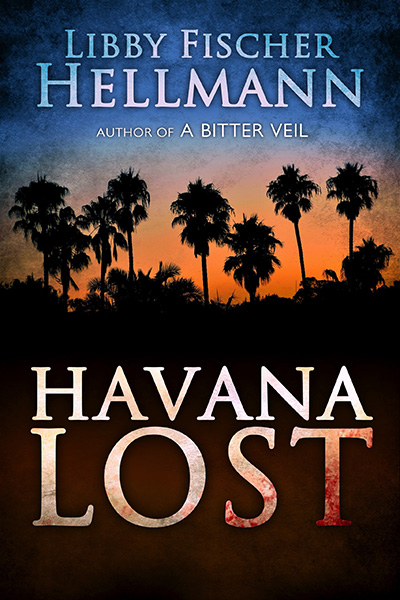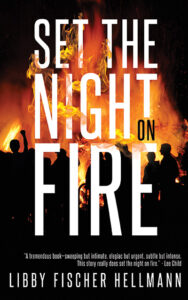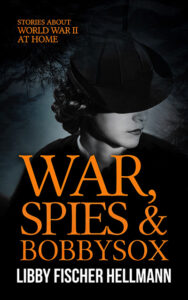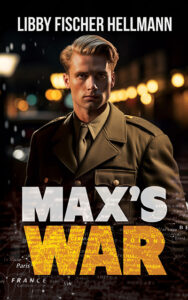 Series: The Saga Series #3
Series: The Saga Series #3Release Date: 2013
Genre: Historical Fiction
Buy the Book:
My books are still available wide, but you’ll find the best prices on my store, especially if you buy more than one novel. Check out the two and three book Bundles here:
Libby's Store
On the eve of the Cuban Revolution, headstrong 18-year-old Francesca Pacelli flees from her ruthless Mafia-boss father in Havana to the arms of her lover, a rebel fighting with Fidel Castro. Her father, desperate to send her to safety in the US, resorts to torture and blackmail as he searches the island for her.
So begins the first part of a spellbinding saga that spans three generations of the same family. Decades later the Pacelli family is lured back to Cuba by the promise of untold riches. But pursuing those riches brings danger as well as opportunity, and ultimately, Francesca must confront the lethal consequences of her choices. From the troubled streets of Havana to the mean streets of Chicago, Havana Lost reveals the true cost of chasing power instead of love.
Havana Lost is award-winning author Libby Fischer Hellmann’s tenth novel and third thriller that explores how strife and revolution affect the human spirit. Havana Lost is a testament to Hellmann’s gift for authentic historical detail as well as her talent for writing compulsively readable thriller.
Honors and Accolades:
- Finalist in Foreword Review Magazine’s Thriller of the Year contest 2013
- “Notable Page-Turner” in Shelf Unbound Magazine’s Book of the Year — 2014
- Honorable Mention in Chicago Writers' Association Best Fiction Book 2013
Reviews:
A many-layered adventure…smart writing, done in accomplished style by an author who never talks down to her readers.
—Mystery Scene Magazine
A riveting historical thriller… This multigenerational page-turner is packed with intrigue and shocking plot twists.
—Booklist
A sprawling tale… the story of the Cuban revolution, as well as the Cuban military efforts in Angola, is fascinating…
—Publishers Weekly
Hellmann’s writing has matured considerably since her early novels. Her plotting has become more solid and assured, her characters more realistic, her settings wonderfully described. This is a fine, extremely well told novel.
—Deadly Pleasures
Masterfully crafted…Hellmann has a superb gift for the colorful depiction of her characters. I can’t imagine any noir aficionado not enjoying Havana Lost.
—A Literary Reeder
A cautionary tale… great historical detail… interesting story, ambitious, enjoyable!
—Romantic Times
Also in this series:
Excerpt:
Chapter One
In the half-second between the explosion and his awareness of it, Federico Vasquez wasn’t sure it was real. The flash of white light slicing through the tropical noontime sun could have been an illusion, something he might have missed if he’d blinked. The ear-splitting boom, oddly crunchy, was followed by a deep rumble and could have been a dream. Likewise the wave of hot noise that expanded until a deafening silence took its place. Even the shaky ground, rattling windows, and trembling leaves seemed unearthly and strange.
But the smells confirmed it. The chalky smell of overheated Havana pavement gave way to a gunpowder-y, flinty odor. With it came the scent of char, all of it tinged with a slight alcohol—or was it gasoline?—aroma.
This was no dream.
A scream pierced the silence. Then another. Flames erupted from the bank on the corner. Plumes of orange and yellow climbed the sides of the building, then rose as black smoke. Traffic on both sides of La Rampa skidded to a stop. Horrified pedestrians bolted in a frantic rush. Vasquez was safe, a hundred yards away in the jewelry store he owned, but the terror was contagious, and he started to shake uncontrollably. A sickly sweet odor, like fat sizzling on a grill, filtered through the air.
“Aaayy Dios Mio!” he cried out to the only customer in the store. “What is to come of us? It is one thing when the rebels are in the mountains, but when they come to Havana… on La Rampa…” He wrung his hands. “This will not end well.”
The customer, Señorita Pacelli, joined him at the front of the store, and together they watched the scene unfold. Vasquez sensed she wasn’t fearful, as most women would be. Just quiet.
Within minutes, La Rampa was blocked by police cars, sirens wailing. A platoon of fire trucks, ambulances, and military jeeps followed. The police set up barricades on both ends of the block. A cadre of soldiers tried to manage the crowd, which now that the initial horror had subsided, was huge.
Vasquez glanced over at the young woman. Her composure in the midst of mayhem was unsettling. Then again, she wasn’t Cuban. She was an American. Of Italian descent. From a family that would as soon cut off your hand as shake it. But she and her ilk were his best customers these days. He ran his hands up the lapels of his jacket and cleared his throat.
“My apologies, Señorita.” He made an effort to bring himself under control. “For my outburst. It was—inappropriate. Are you all right? May I bring you a glass of water to settle your nerves?”
The girl didn’t appear as if she needed anything, and she shook her head. With her long black hair, high cheekbones, and slim but curvy figure, she was the kind of girl men stopped to look at. And when they saw her eyes, large and dark and luminous, they usually took a second look. Why, he could—Vasquez stopped himself. He was old enough to be her grandfather. “I will get your watch. It is ready.”
“Oh, Señor Vasquez, I don’t care about the watch.” She looked through the shop’s window. The blinding mid-day light offered no respite, and the scene at the bank looked bleak. “Do you think perhaps it was merely an accident? A gas explosion? Something overheated, maybe? That kind of thing has been known—”
“Not possible.” He cut her off. “Banco Pacifico is a government bank. Favored by Batista…” he paused, “… and Americans.”
The girl looked down. Vasquez couldn’t tell if she was angry or ashamed. Señorita Pacelli’s father was manager and part owner of La Perla, one of the newest and most luxurious resort casinos in Havana. Before that the man had managed the casino at the Oriental Park Racetrack for Meyer Lansky. Vasquez didn’t particularly like Pacelli, but he depended on him. At Pacelli’s recommendation, tourists flocked to his store, eager to buy a bracelet, ring, or bauble to remind them of their Havana vacation. Pacelli never asked for anything in return: no kickback, discount, nothing. Still, this girl and her family would always be outsiders. Tolerated, perhaps, because of their money, power, and connections, but like all colonialists, never truly accepted.
The girl craned her neck toward the bank. A sad look swept across her face. “When I was a little girl, my father used to take me with him when he went to the bank. I remember how cool the marble floor was, especially on hot days; how the ceiling fan blades made slow, lazy circles. How I could tell how much taller I’d grown since the last trip by measuring myself against those tall black counters.” Her voice trailed off. Vasquez almost felt sorry for her. Then her face took on a determined expression, as if she’d made a decision.
“Señor Vasquez, I will come back for the watch. I want to go down to the bank.”
He wagged a stern finger. “No, Señorita. It is not a good idea. Too dangerous. Stay here until the street reopens. I will call your father and tell him you are safe.”
“But what if there are people who need help? I could—”
A long black Cadillac with enormous tail fins suddenly slid to the curb, and a man in black pants, white shirt, and black cap jumped out.
The chauffeur. How had he made it onto La Rampa? Vasquez opened the door of the shop. The chauffeur had driven the car onto the sidewalk, that’s how. A few nearby shopkeepers and pedestrians who’d gathered to watch the carnage stared. They probably didn’t know who the car belonged to, but their subtle hostility indicated they knew it was someone rich. And therefore not to be trusted.
“Too late.” The girl squared her shoulders, and went through the door. “Enrico!”
The chauffeur spun around. When he spotted her, a relieved look swept over him. He hurried over. “Señorita Pacelli, you must come with me. Your father is crazy with worry.”
“Tell him I’m fine. I want to stay.”
“No, Miss Francesca.” He gripped her arm. “Your father says you must come home. Now.”
Her body seemed to deflate, and she allowed him to lead her to the car. Vasquez knew the chauffeur was, in fact, a bodyguard. Hired to protect her, especially in a situation such as this. Vasquez saw her take one last glance at the bank.
Water poured out of hoses and helped smother the flames. Several people on gurneys were wheeled toward ambulances. The crowd was still growing, and there didn’t seem to be any order to it, but the screams and sirens had stopped, replaced by occasional shouts and commands. Two police officials emerged from the bank, carrying what looked to be a dead body. Vasquez turned away.
The chauffeur led the girl to the Cadillac. The engine was still running; Vasquez could see tiny puffs of white coming from the tail pipe. The chauffeur opened the back door, and the girl climbed in.





